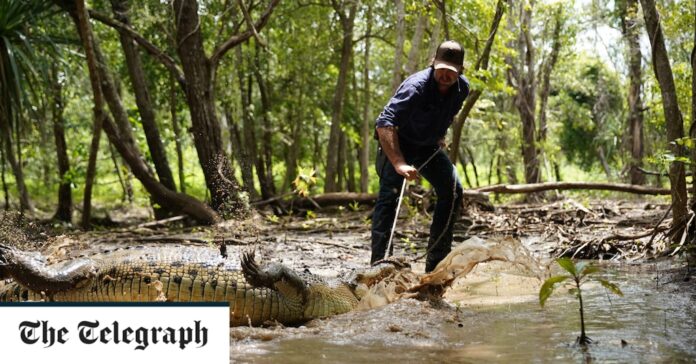Matt Wright spends his days capturing crocs for Netflix’s series Wild Croc Territory. But how does he snare the fearsome beasts?
The hero of Wild Croc Territory, the new Netflix show fronted by Australian crocodile wrangler Matt Wright, isn’t just Wright himself – it’s gaffer tape. This, it turns out, is the most essential ingredient in disabling enormous crocodiles so that they can be relocated to a less dangerous environment. In a split second the animal could tear off the nearest limb it is able to find. But not with gaffer tape. Enough gaffer tape and the reptile’s jaws are held shut.
Crocodiles are hefty, lethal animals – something Wright knows better than anyone. “They definitely are one of the most powerful animals I’ve had to work with,” he says, speaking to me from Hammersmith just before flying back to Australia. In the show, which launched on Netflix in October, he deals with crocs that can weigh around 900kg (about the heft of two grand pianos or one 1979 Volkswagen Beetle) and measure up to five metres long. When they swing their tails, which are pure muscle, “it’s like 40 sledgehammers coming at you in one hit”, says Wright. He has been sent 10 feet into the air onto his head just by a crocodile tail.
In shirt, jeans and ubiquitous cap, Wright spends the episodes of Wild Croc Territory searching the water for crocodiles with his crew. His is a reassuring presence and his sparkly green eyes and plentiful brown hair don’t do any harm. Each of his rescue missions is different, and each of them a lesson in thinking on your feet. It may be that water has dried up in one area, forcing cattle into a particular spot to drink – where the crocodiles are waiting and picking them off. Wright travels to the crocs, traps them, then relocates them to somewhere they will no longer pose a threat to cattle or people.
The fundamentals of each expedition remain similar: Wright and his crew will transport a heavy metal trap to the whereabouts of the crocodile, either by truck or by helicopter, and lay some bait inside. Once the crocodile takes the bait, pulling it hard enough to close the trap, the team can do the hard part: lassoing a rope under the roof of its mouth so that it can be controlled. Wright will often drape a wet cloth over the animal’s eyes in order to calm it down. Then it’s a case of wrapping the all-important gaffer tape around its jaws and hauling it onto a truck or behind a boat to begin the relocation.


